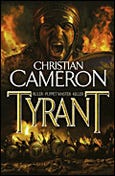The Greeks had a word for it: philia: selfless brotherly love. The heart of Tyrant is the bond between brothers-in-arms fighting for their freedom against the forces of a man seen by some as a demi-god, by others as a tyrannical monster: Alexander the Great.
Young Athenian aristocrat Kineas belongs to an elite Greek Companion cavalry unit fighting under Alexander’s command during his successful campaign in Asia Minor against the Persian Empire. Kineas distinguishes himself in action at the Battle of Issus in 333 B.C., winning Alexander’s favour. For six years he rides with the charismatic Macedonian king, only to be rewarded with a curt dismissal at the war’s end.
The Tyrant Leucon hires Kineas to turn the men of his city into an effective army. Leucon is absolute ruler of Olbia, a Greek trading centre on the shores of the Euxine (today’s Black Sea), made rich by trade with the nomadic Scythian tribes of the Sea of Grass - the Eurasian steppes. It won’t be an easy task. Kineas must win over a hostile, disparate group; mercenaries, haughty gentlemen landowners, wealthy merchants, smallholders and poor townsmen, united only in their resentment of the Athenian captain and his companions.
Olbia simmers with political intrigue and rumours of imminent invasion by a host fielded by Antipater, Alexander's regent in Macedonia. But no one knows better than Kineas how to beat the Macedonians. He's a leader who inspires love and loyalty, and a gifted strategist. He also has a formidable ally in Satrax, king of the Scythian warrior horsemen with whom Kineas feels a strong affinity. Can Greeks and Scythians put aside their mutual suspicion and together thwart the Macedonian juggernaut that threatens both?
Although a military adventure, Tyrant’s vividly realised ancient world with its many races and cultures encompasses not only the machinery of war, but also politics, social structures, philosophy, and religion. It is peopled by strong, sympathetic characters whose fate quickly arouses compulsive interest. (2008; 400 pages, including a glossary of Greek terminology)



